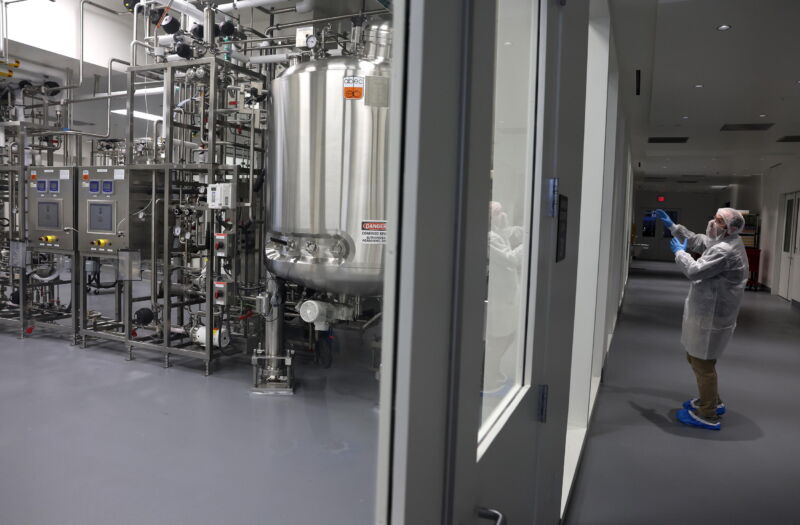
Justin Sullivan/Getty Images
Months in jail and thousands of dollars in fines and legal fees—those are the consequences Alabamians and Arizonans could soon face for selling cell-cultured meat products that could cut into the profits of ranchers, farmers and meatpackers in each state.
State legislators from Florida to Arizona are seeking to ban meat grown from animal cells in labs, citing a “war on our ranching” and a need to protect the agriculture industry from efforts to reduce the consumption of animal protein, thereby reducing the high volume of climate-warming methane emissions the sector emits.
Agriculture accounts for about 11 percent of the country’s greenhouse gas emissions, according to federal data, with livestock such as cattle making up a quarter of those emissions, predominantly from their burps, which release methane—a potent greenhouse gas that’s roughly 80 times more effective at warming the atmosphere than carbon dioxide over 20 years. Globally, agriculture accounts for about 37 percent of methane emissions.
For years, climate activists have been calling for more scrutiny and regulation of emissions from the agricultural sector and for nations to reduce their consumption of meat and dairy products due to their climate impacts. Last year, over 150 countries pledged to voluntarily cut emissions from food and agriculture at the United Nations’ annual climate summit.
But the industry has avoided increased regulation and pushed back against efforts to decrease the consumption of meat, with help from local and state governments across the US
Bills in Alabama, Arizona, Florida and Tennessee are just the latest legislation passed in statehouses across the US that have targeted cell-cultured meat, which is produced by taking a sample of an animal’s muscle cells and growing them into edible products in a lab. Sixteen states—Alabama, Arkansas, Georgia, Kansas, Kentucky, Louisiana, Maine, Mississippi, Missouri, Montana, North Dakota, Oklahoma, South Carolina, South Dakota, Texas and Wyoming—have passed laws addressing the use of the word “meat” in such products’ packaging, according to the National Agricultural Law Center at the University of Arkansas, with some prohibiting cell-cultured, plant-based or insect-based food products from being labeled as meat.
“Cell-cultured meat products are so new that there’s not really a framework for how state and federal labeling will work together,” said Rusty Rumley, a senior staff attorney with the National Agricultural Law Center, resulting in no standardized requirements for how to label the products, though legislation has been proposed that could change that.
At the federal level, Rep. Mark Alford (R-Mo.) introduced the Fair and Accurate Ingredient Representation on Labels Act of 2024, which would authorize the United States Department of Agriculture to regulate imitation meat products and restrict their sale if they are not properly labeled, and US Sens. Jon Tester (D-Mont.) and Mike Rounds (R-S.D.) introduced a bill to ban schools from serving cell-cultured meat.
But while plant-based meat substitutes are widespread, cell-cultivated meats are not widely available, with none currently being sold in stores. Just last summer, federal agencies gave their first-ever approvals to two companies making cell-cultivated poultry products, which are appearing on restaurant menus. The meat substitutes have garnered the support of some significant investors, including billionaire Bill Gates, who has been the subject of attacks from supporters of some of the state legislation proposed.
“Let me start off by explaining why I drafted this bill,” said Rep. David Marshall, an Arizona Republican who proposed legislation to ban cell-cultured meat from being sold or produced in the state, during a hearing on the bill. “It’s because of organizations like the FDA and the World Economic Forum, also Bill Gates and others, who have openly declared war on our ranching.”
In Alabama, fear of “franken-meat” competition spurs legislation
In Alabama, an effort to ban lab-grown meat is winding its way through the State House in Montgomery.
There, state senators have already passed a bill that would make it a misdemeanor, punishable by up to three months in jail and a $500 fine, to sell, manufacture or distribute what the proposed legislation labels “cultivated food products.” An earlier version of the bill called lab-grown protein “meat” but it was quickly revised by lawmakers. The bill passed out of committee and through the Senate without opposition from any of its members.
Now, the bill is headed toward a vote in the Alabama House of Representatives, where the body’s health committee recently held a public hearing on the issue. Rep. Danny Crawford, who is carrying the bill in the body, told fellow lawmakers during that hearing that he’s concerned about two issues: health risks and competition for Alabama farmers.=
“Lab-grown meat or whatever you want to call it—we’re not sure all of the long-term problems with that,” he said. “And it does compete with our farming industry.”
Crawford said that legislators had heard from NASA, which expressed concern about the bill’s impact on programs to develop alternative proteins for astronauts. An amendment to the bill will address that problem, Crawford said, allowing an exemption for research purposes.




















+ There are no comments
Add yours